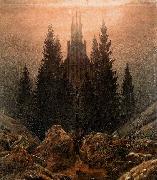Wholesale Oil Painting No Minimum |
|||||||||||
|
|
|||||||||||

|
|||||||||||
|
|
|
||||||||
Caspar David Friedrich1774-1840 Caspar David Friedrich Locations German painter, studied art at Copenhagen, and in 1798 settled in Dresden. Friedrich painted chiefly landscapes and seascapes, with and without figures, architectural pictures, including a few of Dresden, and some religious subjects. Religious feeling and symbolism permeate his œuvre, of which the seascape with figures, Die Lebensstufen, is a characteristic example. He possessed considerable power to convey mood in landscape. Almost forgotten in the 19th c. and early 20th c., interest in his work increased considerably in the mid-20th c. He is hardly represented in Britain, but an exhibition of 112 of his pictures at the Tate Gallery in 1972 attracted much attention. F. G. Kersting was a friend of Friedrich. |
||||||||
|
|
||||||||
The Cross in the Mountains
The Cross in the Mountains Painting ID:: 44157 |
1812
Oil on canvas,
45 x 37 cm 1812 Oil on canvas, 45 x 37 cm |
|||||||
|
|
||||||||
|
Friedrich Johann Overbeck 1789-1869 German German religious painter. Expelled from the Vienna Academy because of his opposition to its classicism, he went to Rome and with Peter von Cornelius, Veit, Schadow-Godenhaus, and others, formed the group known as the Nazarenes. His first real successes were his frescoes for the Casa Bartholdy (now in Berlin) and for the Villa Massimo. Among his notable paintings are Christ Entry into Jerusalem and Christ Agony in the Garden. Overbeck sought to make his art serve religion. His influence was due more to the purity of his doctrine than to the power of his work, which is often lacking in pictorial appeal and in color. The Cross in the Mountains 1812 Oil on canvas, 45 x 37 cm Museum Kunst Palast, Desseldorf Visions of Gothic architecture appear regularly in the artist's work from Winter Landscape with Church (1811, Dortmund), rising like a man-made enigma in a mysterious landscape scenario. An example is provided by The Cross in the Mountains, which can be dated fairly confidently to 1812, and which has long been viewed as a further development of the Tetschen Altar. The rough and rocky terrain of the foreground surrounds a spring, behind which, within an indeterminate space, rise a dark wall of fir trees and the gabled faeade of a Gothic church, reduced to a shadowy silhouette. A wayside calvary marks the border between foreground and back- ground. The logic of space and time seems to have been abandoned in this painting in favour of the unreality of a dream. Artist: FRIEDRICH, Caspar David Title: The Cross in the Mountains , painting Date: 1801-1850 German : landscape |
||||||||
|
|
||||||||
|
Prev Next
|
||||||||
|
|
||||||||
|
Related Paintings to Friedrich Johann Overbeck :. |
||||||||
|
|
||||||||
|
CONTACT US |

